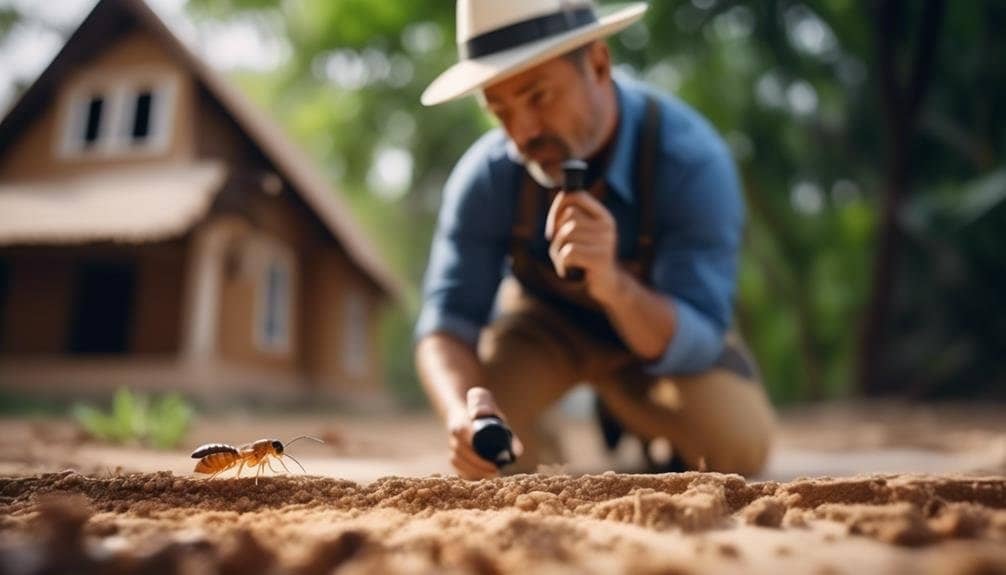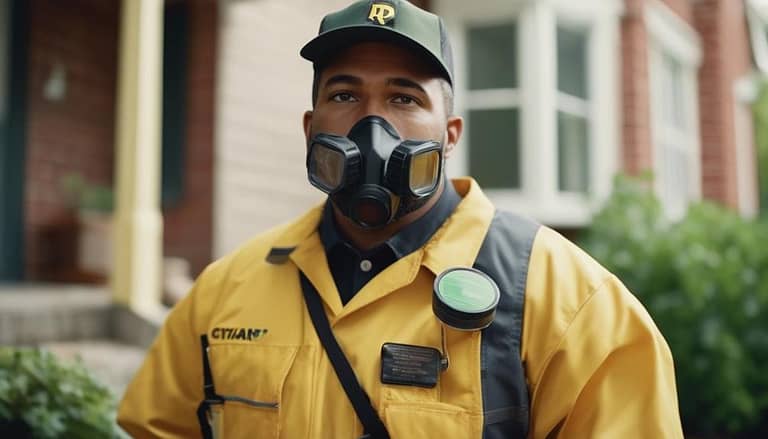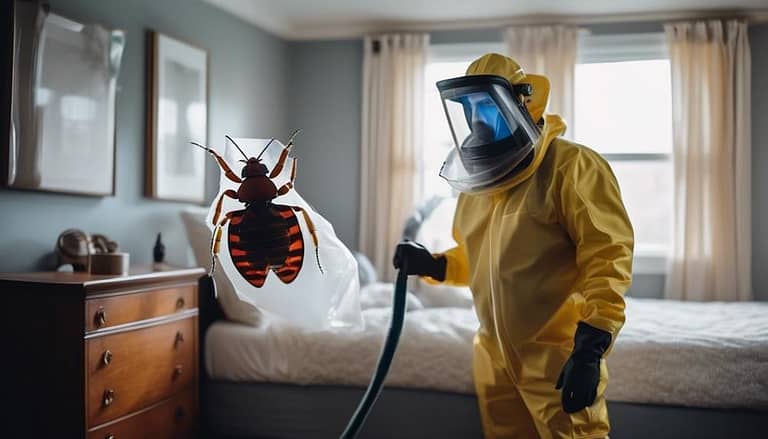Pittsburgh's Top 5 Termite Inspection & Treatment Steps
As a homeowner in Pittsburgh, you may come across small piles of sawdust near your baseboards as you walk through your home. This could be a sign of termites, and it's important to understand the steps you should take to address this potential threat. Safeguarding your property from these destructive pests is crucial for your peace of mind. Let's explore the essential measures to protect your home from termites.
- Start by examining the areas where you noticed the sawdust. Look for mud tubes, tiny holes in the wood, or any other signs of termite activity. This initial inspection will help you determine the extent of the infestation.
- Once you've identified the potential termite problem, it's time to consult with a professional termite inspector. They will conduct a thorough assessment of your property to confirm the presence of termites and evaluate the extent of the damage.
- Based on the inspector's findings, it's important to discuss treatment options. The inspector can recommend the most effective termite treatment based on the severity of the infestation and the layout of your home. This personalized approach ensures that the treatment is tailored to your specific needs.
- After deciding on the treatment plan, it's time to take action. The chosen treatment may involve applying liquid termiticides, installing bait stations, or using other targeted methods to eliminate termites and prevent future infestations. Trusting the expertise of professionals is key in this step.
- Finally, it's essential to schedule regular follow-up inspections to monitor the success of the treatment and ensure that your home remains termite-free. This proactive approach helps prevent any potential re-infestations and gives you the peace of mind that your home is well-protected.
Understanding these steps and working with experienced professionals will help you address any potential termite issues in your Pittsburgh home, ensuring the long-term safety and integrity of your property.
Key Takeaways
Are you a homeowner in Pittsburgh? Have you noticed small piles of sawdust near your baseboards? This could be a sign of termites, and it's crucial to know what steps to take to address this potential threat. Protecting your property from these destructive pests is essential for your peace of mind. Let's go through the necessary measures to safeguard your home from termites.
First, check the areas where you saw the sawdust. Look for mud tubes, tiny holes in the wood, or any other signs of termite activity. This initial inspection will help you figure out how severe the infestation is.
Once you've identified a potential termite problem, it's time to consult with a professional termite inspector. They will thoroughly assess your property to confirm the presence of termites and evaluate the extent of the damage.
Based on the inspector's findings, it's important to talk about treatment options. The inspector can suggest the most effective termite treatment based on the severity of the infestation and the layout of your home. This personalized approach ensures that the treatment is tailored to your specific needs.
After deciding on the treatment plan, it's time to take action. The chosen treatment may involve applying liquid termiticides, installing bait stations, or using other targeted methods to eliminate termites and prevent future infestations. Trusting the expertise of professionals is key in this step.
Finally, it's essential to schedule regular follow-up inspections to monitor the success of the treatment and ensure that your home remains termite-free. This proactive approach helps prevent any potential re-infestations and gives you the peace of mind that your home is well-protected.
Understanding these steps and working with experienced professionals will help you address any potential termite issues in your Pittsburgh home, ensuring the long-term safety and integrity of your property.
Termite Inspection Preparations
Get your home ready for a termite inspection by clearing clutter, making sure all areas are accessible, fixing leaks, trimming vegetation, and moving stored items away from the walls.
In Pittsburgh, termite inspection is really important for both homes and businesses. These preparation steps will help ensure a thorough inspection to find any potential termite problems.
Clearing clutter and obstacles around the house will make it easy for the pest professional to get to all areas, like the attic, basement, and crawl spaces. Fixing leaks and dealing with any moisture issues is crucial because termites like damp places.
Trimming overgrown vegetation and tree branches that touch the house will help stop termites from using them to get inside. Also, moving stored items away from the walls will make it easier to inspect the perimeter.
Doing these things will help the pest professional find and deal with any potential termite issues to protect your property.
Conducting Thorough Termite Inspections
When you're looking for a termite inspection, it's important to make sure the pest control company is legit. Check with the Better Business Bureau (BBB) and local review sites to verify their credibility.
Also, ensure they've the right licenses and permits for pest control in your area. Find out how much experience they've dealing with pests like termites and if they use safe and effective methods.
Ask about the cost of their services and if they offer a satisfaction guarantee. It's crucial to choose a reputable and experienced pest control company for termite inspections to protect your home from these pests.
Identifying Termite Infestation Signs

When checking for signs of termite infestation, make sure to inspect your property thoroughly. Look out for discarded termite wings, mud tubes on the exterior walls, and listen for hollow sounds when tapping on wood surfaces. Keep an eye out for bubbling or uneven paint and frass that looks like sawdust near or inside wood.
In Pittsburgh, termite infestations can cause serious damage to homes and businesses. It's crucial to spot these signs early to prevent extensive harm. Discarded termite wings indicate a potential termite swarm, while mud tubes on exterior walls show termite activity. Tap on wood surfaces to listen for hollow sounds, which could mean termite damage. Also, watch for bubbling or uneven paint, which may reveal termite presence beneath the surface. Frass, resembling sawdust, is a common sign of termite infestations near or inside wood.
Identifying these signs early is essential for effective pest control and treatment. By staying vigilant and recognizing these indicators, homeowners can take proactive measures to address termite infestations before significant damage occurs.
Implementing Effective Termite Treatment
Dealing with a termite problem at home? Here's what you need to do for effective termite treatment:
- Check the Company's Credentials: Make sure the pest control company is licensed and has the right permits for termite treatment. Look for memberships in professional organizations like the National Pest Management Association (NPMA) and see if they've experience dealing with pests in your area.
- Confirm Their Legitimacy: Check if the company is legitimate by looking them up on the Better Business Bureau (BBB) and local review sites. This will help you find a trustworthy service provider.
- Ask About Treatment Methods: Find out if they use low toxicity or non-toxic pesticides, and understand the treatment methods they plan to use. This will help you make informed decisions about treating your property.
- Consider Customer Service and Cost: Look into their customer service, monthly pest control options, and ask about the cost of the treatment. Choosing a local pest control provider that offers effective termite inspection and treatment with great customer service can really help you out.
Following these steps will help you make the best decisions for dealing with a termite infestation at home.
Post-Treatment Termite Prevention

Once the termite treatment is done, it's crucial to keep your property safe from future termite invasions. Regularly check for signs of termites to catch any problems early. Clear away wood debris around your home and maintain good drainage to avoid moisture buildup, which attracts termites. You can also consider using physical barriers like metal mesh or sand particles to keep termites from getting into your home's foundation or wooden structures.
For extra protection, use termite prevention treatments such as liquid termiticides or bait stations around your property. These measures add another layer of defense against future termite threats. It's also a good idea to have a professional pest control company do regular termite inspections and treatments. This proactive approach ensures ongoing protection against infestations, giving you peace of mind.
Frequently Asked Questions
Who Is Best for Termite Inspection?
When it comes to termite inspection in Pittsburgh, homeowners have several great options to choose from. Terminix, Witt Pest Management, Stewart Termite & Pest Control, Bee Control, and Perf-A-Lawn Pittsburgh are all top choices for getting thorough inspections and effective treatment options to deal with termite infestations. Taking care of termite inspections is crucial for protecting your home from costly damage caused by these destructive pests.
How Much Does a Termite Inspection Cost in Pa?
In Pennsylvania, a termite inspection typically costs between $75 and $150. It's important to have this done every year to catch infestations early. If additional treatments are needed, they can range from $500 to $2,500. This inspection is crucial for homeowners to protect their investment and prevent costly damage to their homes.
What Is the Most Effective Termite Treatment?
The best way to deal with termites is to have a thorough inspection done to find out how bad the problem is, what kind of termites are causing it, and then use specific methods like baiting systems or liquid termiticides to get rid of them completely and stop them from coming back.
Which Is the Best Anti Termite Treatment?
When dealing with termites, it's best to have a professional pest control company thoroughly inspect your home and then use targeted treatment with low-toxicity or non-toxic pesticides and Integrated Pest Management (IPM) solutions. This is important because it helps ensure that the termites are effectively dealt with while minimizing harm to the environment and your family. By having a licensed professional handle the treatment, you can have peace of mind knowing that your home is being taken care of by experts.







